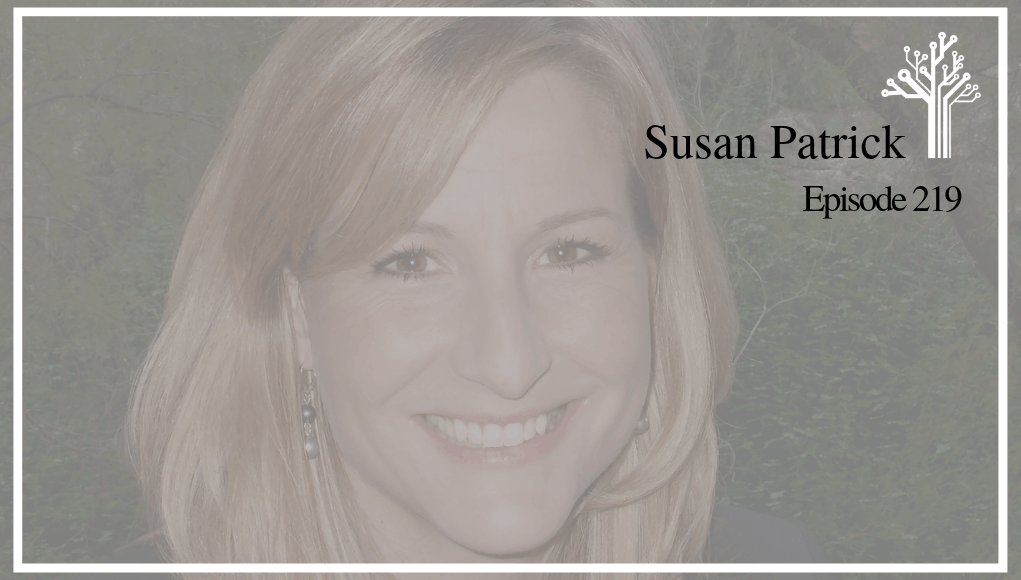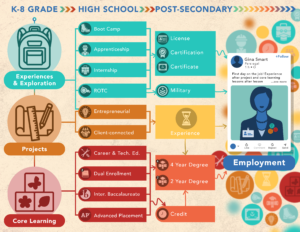Podcast: Susan Patrick on Transforming Education Systems for Equitable High-Quality Learning

For almost two decades, iNACOL (@nacol) has been a leading education advocacy organization. They promote better policies and practices to advance powerful, personalized, learner-centered experiences.
Founded to support online learning teachers and providers, iNACOL added a focus on personalized learning ten years ago. They have also been the leading advocate for competency-based education with great resources on CompetencyWorks.
“iNACOL drives the transformation of education systems and accelerates the advancement of breakthrough policies and practices to ensure high-quality learning for all,” said CEO Susan Patrick (@susandpatrick).
Ten years ago, Patrick built a partnership with Andy Calkins to support Next Generation Learning Challenges. The result was more than 150 new and transformed schools across the country.
A 2016 Eisenhower Fellowship provided Patrick the opportunity to study how world-class expectations and balanced policy models in Australia and New Zealand were promoting equitable outcomes. The experience updated her sense of what is possible and provided a global view of trends in learning.
5 Global Trends
In our conversation, Patrick outlined five global trends in learning:
1. Ensuring education systems are fit for purpose. Education systems should be “fit for purpose,” preparing youth to contribute to an open, healthy and just society.
Compared to other OECD countries, Patrick sees many states and systems “just tweaking the old system,” and “missing the long game.”
Community conversations are the first step for a system fit for purpose. Patrick appreciates the hundreds of communities that have updated their graduate profiles and continue to explore what’s needed in order to ensure that every student has the necessary models and skills.
As the population becomes more multicultural, Patrick said, “We need to keep asking– how do we design a system fit for the world we live in?”
2. Modernizing educator workforce and professional learning. As school systems around the world develop more learner-centered models, it’s critical to build educator capacity. “Everybody learning as they build these new designs,” said Patrick.
iNACOL summarized this trend in 2018 report, Moving Toward Mastery, that describes a teaching profession that is equity-oriented, learning-centered and lifelong.
A growing number of districts are using microcredentials to make professional learning more personalized and competency-based. Kettle Moraine, working with Digital Promise, has been a leader in microcredentials.
3. Innovating education for equity, prioritizing diversity, equity and inclusion. Equity is the organizational driver and the fundamental moral purpose at iNACOL. Patrick is pleased to see inclusion and equity surfacing as a global priority in schools and in society.
“We have to disrupt the structural inequities we’ve inherited,” said Patrick. “Transformation requires that we ask what practices, structure, and pedagogy support high quality learning for all students.”
Environments that have rapidly changed to be more equitable are more focused on the whole child and are building knowledge and skills that are more well rounded. They hold the same high expectations for all students and use more robust evidence-based on student work.
Despite progress on equity, Patrick said in most of our schools the demographics of the teacher workforce still doesn’t reflect the diversity of our youth.
4. Aligning pathways from early childhood, K-12, college and workforce. With the goal of “aligned lifelong learning systems,” Patrick said coherent pathways for learners start with a profile of a graduate like the ones Virginia and South Carolina have created.
Aligned systems are based on quality design principles like those iNACOL published last fall.
 Aligned systems offer transferability and reciprocity between systems (as is common across Europe).
Aligned systems offer transferability and reciprocity between systems (as is common across Europe).
5. Redesigning schools based on the learning sciences. In Fit for Purpose, Patrick and colleagues said, “A school redesign informed by learning sciences puts student success at its center. It incorporates youth development theory, culturally responsive teaching, and evidence-based approaches.” She added, “We must ensure we are designing for equity using research on how students learn best, youth development theory and evidence-based approaches.”
The Best Conference of the Year
The iNACOL Symposium will be held on October 28-31 in Palm Springs, California. The annual convening is the most mission-focused and well-curated convening of the year. It brings together educators, policymakers and researchers interested in transforming education. The sessions are well curated and the keynotes are always inspiring and push leaders and educators to think outside the box.
Big themes for the conference this year include a future focus, whole child personalization, elementary education, and technical to adaptive changes. Our team has our flights booked and bags packed and we can’t wait to be in Palm Springs for this year’s event. If you haven’t already, get registered and plan your trip. You won’t want to miss the speakers or sessions and we promise you won’t regret it!
Key Takeaways:
[1:10] Susan tells the story of how she got to the office of Ed Tech at the Department of Education.
[2:14] Susan tells the origin story of iNACOL.
[3:17] Susan speaks about the shift of iNACOL’s focus to blended and personalized learning.
[6:05] Susan speaks about the partnership between iNACOL and Next Generation Learning Challenges.
[6:52] Susan speaks about the fellowship she did in New Zealand and Australia in 2016 and summarizes what she learned there.
[10:04] Susan summarizes the mission of iNACOL today.
[10:42] Susan and Tom look at some of the top trends that are driving education globally today, starting with the idea of being ‘fit for purpose.
[13:00] Is the work of districts reconsidering their graduate profile and updating their learning outcomes encouraging to Susan?
[15:03] Susan highlights some of the trends she sees with regard to modernizing the workforce in educator development and professional learning.
[17:45] Susan gives her thoughts on micro-credentials.
[19:04] Susan speaks about what she’s seeing globally in terms of innovating for equity and prioritizing diversity in education.
[23:43] As learning environments are innovating, how does Susan suggest we create aligned pathways from early childhood to college?
[28:03] How Susan sees schools being redesigned based on learning science.
[30:18] Susan highlights some of the key lessons she has learned from the last 5–10 iNACOL Symposiums.
[34:58] What to look forward to at the 2019 iNACOL Symposium!
Mentioned in This Episode:
iNACOL
iNACOL Symposium 2019
U.S. Department of Education
Next Generation Learning Challenges
Innovation Lab Network | CCSSO
The League for Innovation in the Community College
Digital Promise
For more, see:
- Kettle Moraine’s Pat DeKlotz on Building a Culture of Innovation
- Empower Learners: 10 Lessons on Innovation Leadership
- How the Micro-Credential Revolution is Transforming Professional Learning
Stay in-the-know with innovations in learning by signing up for the weekly Smart Update. This post includes mentions of a Getting Smart partner. For a full list of partners, affiliate organizations and all other disclosures please see our Partner page.






0 Comments
Leave a Comment
Your email address will not be published. All fields are required.